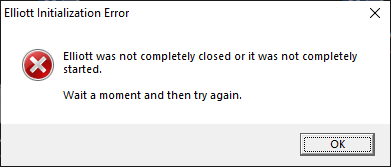Bitdefender Anti-Virus Software Causes Elliott to Fail at Startup
Release Date: 04/12/2022


Version: 7.5 & Up
On Monday, 04/11/2022, we received three separate support incidents that Elliott 8.5 failed to startup.
- One user's entire in-house workstations failed to start. This user is running on an older version of Elliott 8.5 released in 2020.
- One user's entire in-house workstations failed to start. They are running on a relatively new version of Elliott 8.5 release, but not the latest.
- One user's only workstation failed to start. They claim they just installed the latest Elliott on the prior Friday.
The symptoms these users experienced when starting up Elliott 8.5 included receiving the "Starting Elliott v8.5" message as shown below:
But at that point, Elliott would just hang there with no Elliott login prompt afterward.
On Tuesday, 4/12/2022, another user reported that after their user exited Elliott, the Elliott application would not close. This was happening on multiple workstations with Elliott 8.2. When the user tried to startup Elliott again, they received the following message:
Elliott was not completely closed or it was not completely started.Wait a moment and then try again.
At that time, the user had to reboot the workstation in order to startup Elliott again.
Since these four user sites are running on four separate Elliott revisions, we can safely conclude that the issue is not related to Elliott updates. It is likely that the situation has something to do with the Windows service pack update or anti-virus software. After further investigation, we concluded that there were no Windows service pack updates. So our focus turned to the antivirus software.
The particular user we investigated has both Bitdefender and McAfee anti-virus software installed. So we took the following steps:
- We removed Bitdefender and McAfee anti-virus programs, and Elliott worked fine.
- We reinstalled Bitdefender only, and Elliott failed.
- The user's IT whitelisted the local Elliott directory with Bitdefender, and Elliott worked.
At this point, we concluded that Bitdefender anti-virus software was the culprit. It is likely that the weekend update prior to 04/11/2022 caused this issue.
It is very common that anti-virus software can cause this kind of Elliott startup problem. Anti-virus is a black box, Nobody really knows how a particular anti-virus software maker determines which software is good and which is malware except the manufacturer themselves. Anti-virus software vendors will try to test their software with particular applications like Microsoft Office, but it is unlikely that they will test it with Elliott Business Software. Hence, while you are trying to reduce your risk, you are also increasing the risk of Elliott not working. If your Elliott version suddenly fails to startup, the first suspect you should look at is anti-virus software. Disable it and try again.
We recognize that anti-virus software is a necessary evil on users' workstations. However, we have no control over each anti-virus software maker's algorithm that may block Elliott from running. We recommend that all of our users utilize Microsoft Defender, which is free and is the anti-virus software we use in-house. If Elliott has some issue working with Microsoft Defender, at least we will know right away so we can advise you accordingly.
Whitelist Elliott Folder in Anti-Virus Software
- If your software version is prior to 8.5 (i.e., 8.0, 8.1, or 8.2), you should whitelist the <ElliottRoot> folder (e.g., M:\Elliott7) or, be more specific, the <ElliottRoot>\bin (e.g., M:\Elliott7\Bin) folder.
- If your software version is 8.5, and your users run from local, then you need to individually whitelist folders similar to the following: C:\Users\emk\AppData\Local\Netcellent\M\Elliott7\Bin85 (where "emk" is your Windows login user ID and \M\Elliott7 corresponds to your <ElliottRoot> folder on the network drive).
- If your software version is 8.6, and your users run from local, then you need to individually whitelist folders similar to the following: C:\Users\emk\AppData\Local\Netcellent\M\Elliott7\Bin86 (where "emk" is your Windows login user ID and \M\Elliott7 corresponds to your <ElliottRoot> folder on the network drive).
EMK
Related Articles
Anti-Virus Causes PostOffice Emailing Problem
Release Date: 12/29/2017 Q - I have a user who received the following error message when trying to use PostOffice to send order acknowledgement emails: ERROR: Error in processing. The server response was: See http://pobox.com/~djb/docs/smtplf.html. ...Anti-Virus Causes Report Viewer Unhandled Error
Release Date: 01/23/2020 Version: 8.0 & Up A user running Elliott 8.2 received the following error when printing a report to the screen. They rebooted the server a few times, but they were still receiving the following errors when printing reports to ...Windows 10 and Trend Micro Anti-Virus Software
We have conducted some tests on Windows 10 in-house and found that both Elliott V7.5 and 8.0 are compatible with Windows 10. However, on 8/11/2015, we received a support call from a user indicating that his workstation did not work with Elliott after ...Which Anti-Virus Software Do You Recommend to Installing on the Elliott ERP Server?
Release Date: 6/20/17 Q - We are thinking of installing McAfee End Point on the Elliott ERP server. Do you have any opinion about this anti-virus software? A - Generally speaking, we don't recommend installing anti-virus software on the Elliott ...Symantec Endpoint Protection Versions 12 and 14 Cause Elliott Startup Error
Release Date: 05/15/2017 Overview There are some Elliott users who reported between 5/12/17 and 5/15/17 that using the latest anti-virus definition update of Symantec Endpoint Protection Versions 12 and 14 caused an Elliott startup error. The problem ...